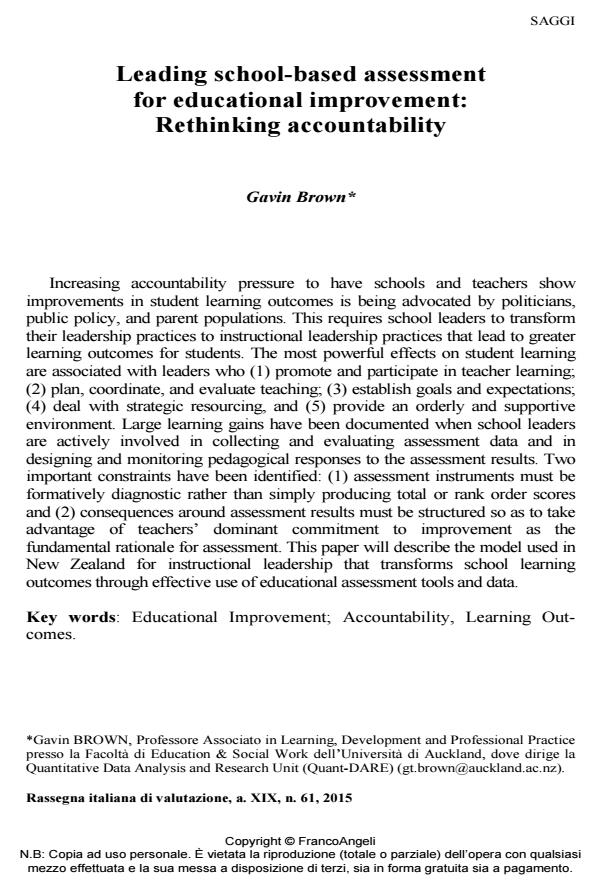Leading school-based assessment for educational improvement: Rethinking accountability
Titolo Rivista RIV Rassegna Italiana di Valutazione
Autori/Curatori Gavin Brown
Anno di pubblicazione 2016 Fascicolo 2015/61
Lingua Inglese Numero pagine 12 P. 70-81 Dimensione file 108 KB
DOI 10.3280/RIV2015-061005
Il DOI è il codice a barre della proprietà intellettuale: per saperne di più
clicca qui
Qui sotto puoi vedere in anteprima la prima pagina di questo articolo.
Se questo articolo ti interessa, lo puoi acquistare (e scaricare in formato pdf) seguendo le facili indicazioni per acquistare il download credit. Acquista Download Credits per scaricare questo Articolo in formato PDF

FrancoAngeli è membro della Publishers International Linking Association, Inc (PILA), associazione indipendente e non profit per facilitare (attraverso i servizi tecnologici implementati da CrossRef.org) l’accesso degli studiosi ai contenuti digitali nelle pubblicazioni professionali e scientifiche.
Increasing accountability pressure to have schools and teachers show improvements in student learning outcomes is being advocated by politicians, public policy, and parent populations. This requires school leaders to transform their leadership practices to instructional leadership practices that lead to greater learning outcomes for students. The most powerful effects on student learning are associated with leaders who (1) promote and participate in teacher learning; (2) plan, coordinate, and evaluate teaching; (3) establish goals and expectations; (4) deal with strategic resourcing, and (5) provide an orderly and supportive environment. Large learning gains have been documented when school leaders are actively involved in collecting and evaluating assessment data and in designing and monitoring pedagogical responses to the assessment results. Two important constraints have been identified: (1) assessment instruments must be formatively diagnostic rather than simply producing total or rank order scores and (2) consequences around assessment results must be structured so as to take advantage of teachers’ dominant commitment to improvement as the fundamental rationale for assessment. This paper will describe the model used in New Zealand for instructional leadership that transforms school learning outcomes through effective use of educational assessment tools and data.
Parole chiave:Educational Improvement; Accountability, Learning Outcomes
- The Role of Pedagogical Practices in Novice Teachers' Work Irit Sasson, David Kalir, Noam Malkinson, in European Journal of Educational Research /2020 pp.457
DOI: 10.12973/eu-jer.9.2.457
Gavin Brown, Leading school-based assessment for educational improvement: Rethinking accountability in "RIV Rassegna Italiana di Valutazione" 61/2015, pp 70-81, DOI: 10.3280/RIV2015-061005